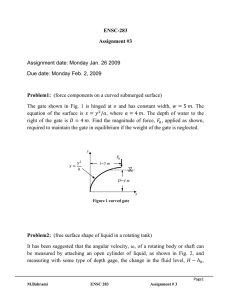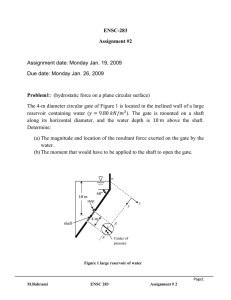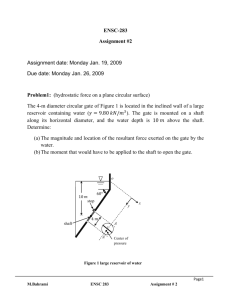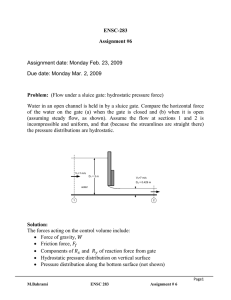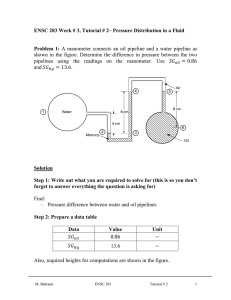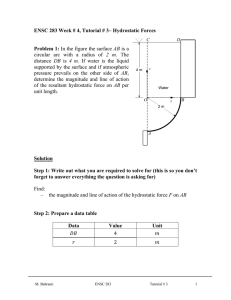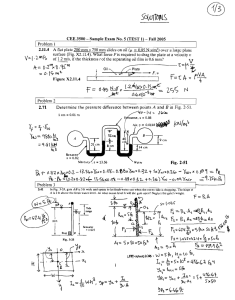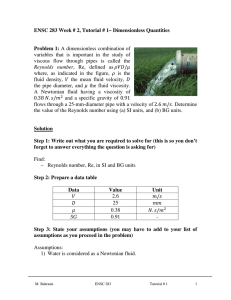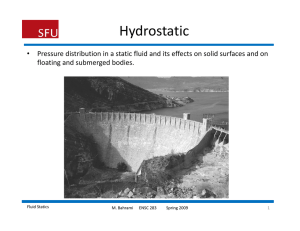ENSC-283 Assignment #3 Problem1:
advertisement
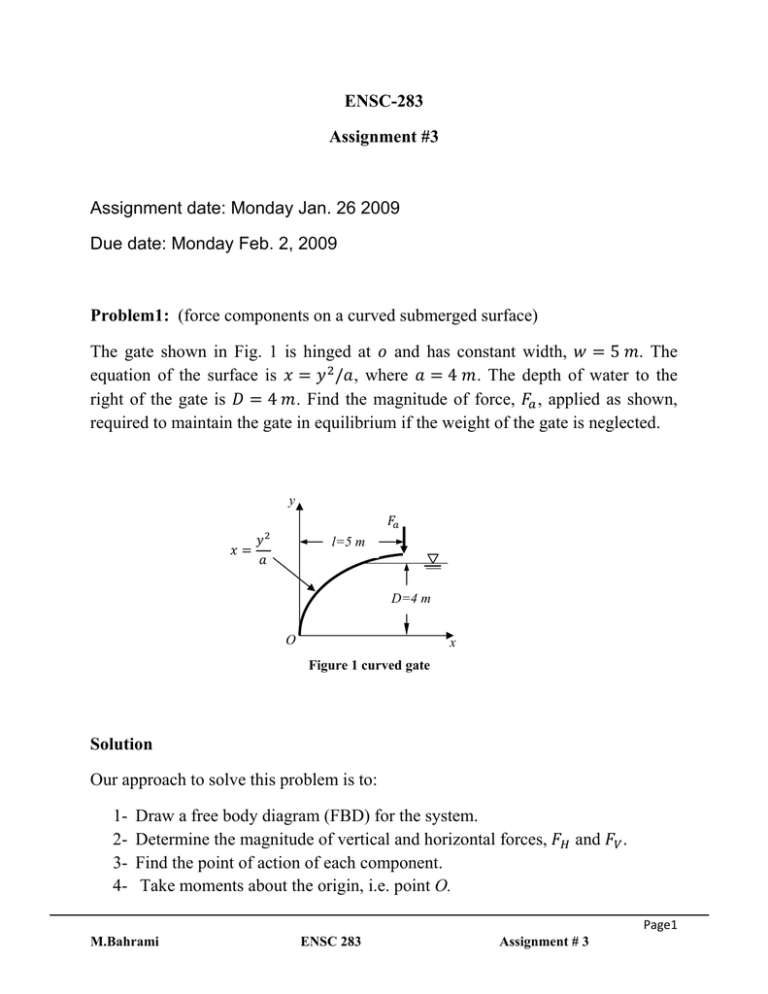
ENSC-283 Assignment #3 Assignment date: Monday Jan. 26 2009 Due date: Monday Feb. 2, 2009 Problem1: (force components on a curved submerged surface) The gate shown in Fig. 1 is hinged at and has constant width, 5 . The equation of the surface is / , where 4 . The depth of water to the right of the gate is 4 . Find the magnitude of force, , applied as shown, required to maintain the gate in equilibrium if the weight of the gate is neglected. y l=5 m D=4 m O x Figure 1 curved gate Solution Our approach to solve this problem is to: 1234- Draw a free body diagram (FBD) for the system. Determine the magnitude of vertical and horizontal forces, Find the point of action of each component. Take moments about the origin, i.e. point O. and . Page1 M.Bahrami ENSC 283 Assignment # 3 Solution trick: We know that the vertical component of the fluid force is equal to the weight of fluid (in magnitude and location) above the curved surface. However, there is no fluid above the gate surface. We know that there is vertical component acting on the surface of the gate and it is upward. (Why?) How we can find this vertical component? Let’s consider Fig. (S1-a). What is special about this case? y O x Figure S1-a Null fluid forces Due to same pressure on both sides of the surface, vertical and horizontal forces acting on both sides of the gate are in balance. Now let’s consider Fig. (S1-b). y FV FH O x Figure S1-b Fluid on the top of the surface You can now easily find the vertical and horizontal forces acting on the gate. These the two forces we are looking for but in the opposite direction. (Why? Look at the FBD of the actual problem, i.e. Fig. S1-c) Page2 M.Bahrami ENSC 283 Assignment # 3 y Fa FV y' FH x O x' Figure S1-c Free body diagram of actual problem To take a moment about point O, we need to know the magnitude of forces as well as and . Horizontal force, and : Magnitude of the horizontal force is given by the magnitude of the force on an equivalent projected vertical flat plate: where /2 and 2 . Thus 4 9810 5 2 392 Point of action for the horizontal force can be obtained from where /12 for rectangular surface. Hence and 2 Vertical force, /12 /2 2 3 2 4 3 2.67 : Page3 M.Bahrami ENSC 283 Assignment # 3 To calculate the vertical force, one should compute the weight of water above the gate as we discussed before. To do so, area of the dashed zone in the following figure times the width of the gate should be calculated. y x O Total volume of the fluid above the gate is 3 Hence vertical force can be obtained from 9810 / 3 3 5 4 4 261 To determine the point of action for the vertical force, you should first find the center of gravity for the water above the gate. Center of gravity can be obtained if one notes that the moment of and the moment of the sum of the differential weights about y axis must be equal (See the following Figure). so / y O M.Bahrami ENSC 283 x Page4 Assignment # 3 x x' √ Substituting , / √ 10 Hence 3 1 10 3 10 10 The final step to determine 3 4 10 4 1.2 is to balace the moments about point O 0 Therefore 1 5 1.2 261 4 2.67 392 167 Page5 M.Bahrami ENSC 283 Assignment # 3 Problem2: (free surface shape of liquid in a rotating tank) It has been suggested that the angular velocity, , of a rotating body or shaft can be measured by attaching an open cylinder of liquid, as shown in Fig. 2, and measuring with some type of depth gage, the change in the fluid level, , caused by the rotation of the fluid. Determine the relationship between this change in fluid level and the angular velocity. Depth gage Initial depth Figure 2 rotating body Solution Page6 M.Bahrami ENSC 283 Assignment # 3 The height of the free surface, following equation , above the tank can be determined from the (1) 2 The initial volume of the fluid in the tank is (2) The volume of the fluid in the rotating tank can be found 2 Letting (3) 2 and using Eqs. (2) and (3) 4 Page7 M.Bahrami ENSC 283 Assignment # 3
